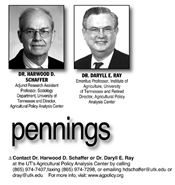|
Been There Done That; It Was Called Freedom To Farm

This last week we were asked by a legal reporter to comment on a recent Tax and Budget Bulletin titled, “Reforming federal farm policies” (https://tinyurl.com/y8bm9ujw) that was issued April 12, 2018 by the Cato Institute. The article was written by Chris Edwards who is editor of DownsizingGovernment.org at Cato.
The article raised a number of challenges to US agricultural policies of which it is the basic one we want to address in this column. By the end of the second paragraph Edwards writes, “President Donald Trump proposed cuts to farm programs in the 2019 federal budget, but the longer term goal should be to fully repeal all farm subsidies.”
Our response to the goal of fully repealing all farm subsidies will be echoed by many of our readers, “Been there, done that, and the result was a very expensive policy disaster.”
In reviewing the 1996 Farm Bill, the Cato bulletin glosses over the impact of “Freedom to Farm” with a simple statement: “But Congress reversed course in the late 1990s, and it passed a series of supplemental farm subsidy bills.”
What they don’t tell their readers is that by 1998, farm income had fallen dramatically, crop prices were below the full cost of production, and things stayed that way for four years. In some years and some states, net farm income was less that direct government farm program payments even though the net farm income numbers include the profits being earned by the livestock sector. Crop farmers were using part of their government payments just to pay for production costs.
Edwards then writes, “As a result, subsidies over the seven years of the 1996 Farm Bill ended up costing more than double what had been promised.” There is no surprise there. Daryll, in his analysis of the 1996 legislation written at the time, predicted that the legislation would be costly.
As we look at the current string of low-price years, there is no evidence that eliminating sensible farm programs would produce different results.
The truth is that whenever we write farm programs that do not take account of the economic characteristics of crop agriculture, they will almost always be significantly more expensive than the Congressional Budget Office projections made at the time the legislation is passed.
We know our regular readers understand the role that the low price-elasticity of supply, the low price-elasticity of demand, and the fixity of resources have in creating long periods of below-the-cost-of-production prices, punctuated by short periods of higher prices in crop markets, but it is obvious that the Cato Institute either doesn’t know about those characteristics or, if they do, they are not telling their readers.
One of the two must be true, otherwise they would not write, “that agriculture is no riskier than other industries and that it does not need an array of federal subsidies.”
We would suggest that their objection is rooted less in economics and more in their political philosophy. That much becomes clear to us when they write about “the central planning philosophy behind farm programs.”
Current farm programs can be accused of many things, but one thing they cannot be accused of is operating out of a “central planning philosophy.” The current set of neo-liberal farm policy prescriptions – all those beginning with the 1996 Farm Bill – have been designed to avoid any taint of a central planning philosophy. In fact, they have been designed to cater to the free market libertarian ideology that is at the heart of the Cato Institute.
The problem is that when Congress tries to cater to the libertarians in designing farm programs they run into a problem. They don’t work because they don’t account for the well-known and -documented economic characteristics. The result is that these programs are significantly more expensive than they would be with a well-designed farm program that benefits farmers, consumers, and the environment and is not trade distorting. ∆
DR. HARWOOD D. SCHAFFER: Adjunct Research Assistant Professor, Sociology Department, University of Tennessee and Director, Agricultural Policy Analysis Center
DR. DARYLL E. RAY: Emeritus Professor, Institute of Agriculture, University of Tennessee and Retired Director, Agricultural Policy Analysis Center
|
|